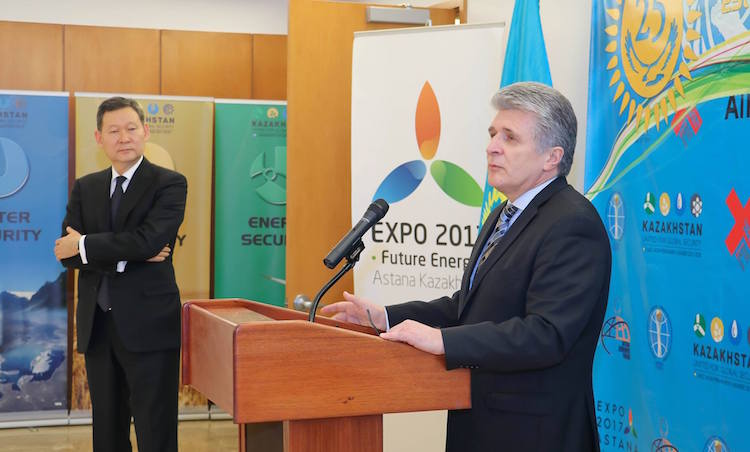
By Miroslav Jenča
Miroslav Jenča is UN Assistant Secretary-General for Political Affairs. Following are his keynote remarks originally delivered on February 17, 2017 at a working luncheon at the Permanent Mission of Kazakhstan to the UN in New York under the title ‘Political and Economic Reforms: Steps in implementing SDG 16’.
NEW YORK (IDN) – More than 150 world leaders came together in New York in September 2015 and adopted the 2030 Agenda for Sustainable Development – a historic pledge to end poverty, hunger and inequality; take action on climate change and the environment; ensure inclusive access to health and education; promote sustainable economic growth for all; and build inclusive, just and peaceful institutions and societies. As we survey the world today – inundated with conflict, crisis and turmoil – delivering on the promises of the 2030 Agenda has greater urgency than ever.
While the 2030 Agenda as a whole is an ambitiously transformative agenda, the premium it places on peace, human rights and inclusivity is perhaps its most remarkable feature. The Agenda recognizes that sustainable development cannot be achieved without peace and that there can be no peace without sustainable development. It is not a coincidence, then, that peace has been included as one of five key prerequisites for the achievement of the 17 Sustainable Development Goals (SDGs), alongside people, planet, prosperity, and partnership.
In this spirit, themes of peace, inclusion and justice are woven across the entire 2030 Agenda, including in a number of targets: equal access to justice; respect for human rights, gender equality, effective rule of law and good governance at all levels; effective, transparent and accountable institutions at all levels of government; responsive, inclusive, participatory and representative decision-making at all levels.
These targets are significant in that they aim to tackle the root causes of violence, instability, inequality and injustice, which continue to lead societies to lasting and intractable strife and turmoil. As such, the SDGs offer an effective blueprint for preventing conflict through building the foundations and enabling environment for a future radically different from today: a future characterized by peaceful, resilient, just and inclusive societies across the globe.
We in the United Nations see the adoption of the 2030 Agenda as a watershed moment to make the promise of the United Nations Charter to “save succeeding generations from the scourge of war” a reality. The preventive essence of the SDGs notably complements and augments our efforts aimed at taking early action to avert violence and grave human rights abuses.
We have known for a long time that prevention is far more cost effective and life-saving than conflict resolution. That is not to say that prevention works in all cases but, when it does, far fewer lives are lost, far less destruction and suffering takes place, and far fewer communities and societies are affected for generations by the calamities of war. Yet, the international community has struggled time and again to fulfil the promise of “never again”.
It is precisely for that reason that Secretary-General António Guterres has recommitted the United Nations to a culture of prevention. As he noted in his address to the Security Council on January 10, 2017, prevention is not merely a priority but, rather, “the priority”.
He has also made “diplomacy for peace” the mantra of his tenure and has taken a number of internal initiatives to make the United Nations more equipped as an effective preventive actor. His vision builds on a number of reform initiatives spearheaded by former Secretary-General Ban Ki-Moon, including the High-Level Independent Review of the Peace Operations; Peacebuilding Architecture Review; the Global Study on Security Council resolution 1325 on Women, Peace and Security; and the Human Rights up Front Action Plan.
Of course, the United Nations cannot do this work alone. For prevention to bear fruit, we will need the political and financial backing of our Member States. We will also need to work hand-in-hand with civil society, particularly women and youth groups, and the private sector as well as regional and international partners, including the international financial institutions.
Many Member States have already taken the cause of prevention to heart, particularly in their approach to SDG implementation. For example, Kazakhstan, together with other Central Asian countries, has actively supported the United Nations Regional Centre for Preventive Diplomacy in Ashgabat.
The Government of Kazakhstan has also been an advocate for prevention at the global stage through its role as a non-permanent member of the Security Council.
Kazakhstan has been an important global actor on several issues of significance to the maintenance of peace and security – be it nuclear disarmament, counterterrorism, transboundary water issues or the recent hosting of peace talks on Syria in Astana.
President Nazarbayev has recently laid out broad reforms related to governance and the economy that are said to be aimed to help the country keep pace with global developments and demands. I look forward to active discussion of these initiatives, both in the public sphere and in parliament. Such discussion will help ensure that the reforms have broad support and become part of the framework for the implementation of the 2030 Agenda in the country.
The 2030 Agenda for Sustainable Development presents us with a significant opportunity to build the foundations for a peaceful, just and inclusive future and “save succeeding generations from the scourge of war”. To fulfil its promises, we will need to pull our resources and efforts together – at global, regional and national levels – and enhance synergy and coordination of our approaches. The United Nations counts on governments to extend their full support and help us make peace a reality for future generations. [IDN-InDepthNews – 28 February 2017]
Photo: Miroslav Jenca describes Kazakhstan “an important global actor on several issues of significance to the maintenance of peace and security” as Ambassador Kairat Umarov, Permanent Representative of the Republic of Kazakhstan to the United Nations in New York, looks on. Credit: Kazakh Permanent Mission.
IDN is flagship agency of the International Press Syndicate.











